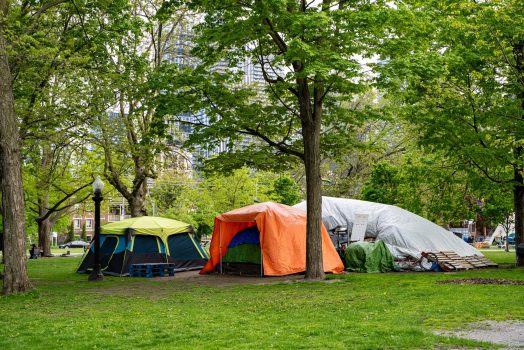
By Alex Santiago
In light of the recent Grants Pass v. Johnson decision by the ultra-conservative bloc of the U.S. Supreme Court, which enables localities to criminalize homelessness, cities nationwide have begun relentless homelessness sweeps, tearing down encampments, destroying personal property and displacing unhoused people from what is often their only option: the streets. The 6-3 decision overturned precedent from the 2018 case Martin v. Boise which said cities could prosecute sleeping outside only if there were available alternatives, notably shelter beds.
The Grants Pass decision disregards that the vast majority of unhoused people would, in fact, rather be housed, but there is often not sufficient housing available due to widespread single-family zoning or as a result of other ineffective housing policies. For example, in San Francisco, housing has been exorbitantly priced out of proportion so that even working-class and middle-class people cannot afford a place to live. As for shelter beds, and the reason for why homelessness is a church-state separation issue, these accommodations can often come with stipulations.
Even in cases where housing is “available,” the fine print makes it clear why individuals might prefer to stay on the streets. Many shelters require people to discard their personal property, be separated by gender (marginalizing trans and nonbinary people) or be removed from a partner or loved one, and often only offer temporary shelter for a few days or weeks.
And oftentimes, such as in Grants Pass, Oregon, the only organized form of temporary shelter comes from a faith-based organization or church. And while this can mean an opportunity for the unhoused to receive these essential resources, churches can use this resource gap as an opportunity to proselytize a vulnerable population.
In her dissent in the Grants Pass v. Johnson case, Justice Sonia Sotomayor states, “The beds at Grants Pass’s charity-run shelter did not qualify as ‘available’ [in reference to Martin v. Boise] in part because that shelter has rules requiring residents to abstain from smoking and to attend religious services.”
Religious requirements marginalize a large part of the unhoused population who are seeking help. And yet another level of threat to the separation of church and state is added when these religious organizations receive public funding. Take Camp Hope, a temporary homeless shelter in Yakima, Washington, which received a warning letter from the ACLU after allegedly “conducting religious activities during government-paid work hours.” Despite receiving taxpayer money to fund their resources, they required those who did not wish to participate in proselytizing activities to leave the building.
It is only on rare occasions when the unhoused are actually able to seek justice in the courts for these violations of their religious freedom, as the struggle to survive often takes precedence.
Why is this problematic? People who have been forced onto the streets as a result of the failures of our health care, veteran-support and foremostly housing policies deserve to receive support that does not require them to go against their own moral or religious views in order to access basic needs. If it is a requirement to attend a sermon, get baptized or even pray to access services, this forces a huge portion of the unhoused population to have to choose between their personal beliefs and morals and accessing basic needs.
What must be done? More than anything, the criminalization of the unhoused must stop in the United States. Whereas America has an induced housing crisis, because of the failures of our health care system and housing policy for decades, it should also befall on the state to remedy those failures with resources to support unhoused people. As covered in the 5-4 podcast’s “Grants Pass v. Johnson” episode, most units that are assigned to the “Homeless Problem” are placed within police departments. Thus, we also need a system that doesn’t reflect our prisons, actively separating people from their loved ones and not allowing them to live as their authentic selves – all simply for not having a place to sleep at night. People deserve a place to sleep without the strings of proselytization attached, unbiased to their race, gender, sexuality or religion.
Thus, while the federal government and states haven’t hesitated when providing billions of funding for prison beds, they have faltered repeatedly when investing in affordable housing and stronger communities. As leaders from the Christian organization Mobile Loaves & Fishes, which focuses on a non-proselytizing mission of housing and the recovery of unhoused people, say, “Housing alone will never solve homelessness, but community will.” We need a system that humanizes the unhoused once again, by aid of community-centered resources, for the only crime that’s been committed has been by the standing system itself.
Alex Santiago (she/they) is a Youth Organizing Fellow with Americans United.